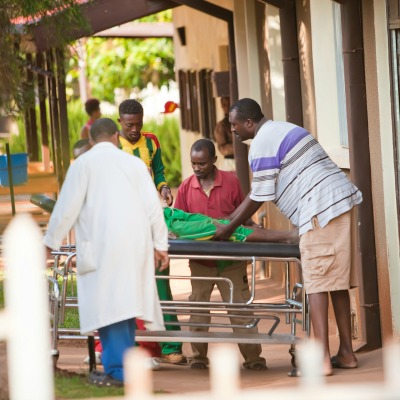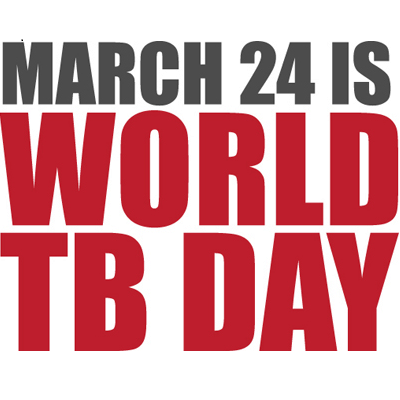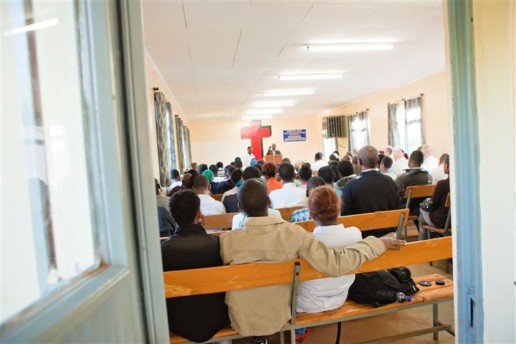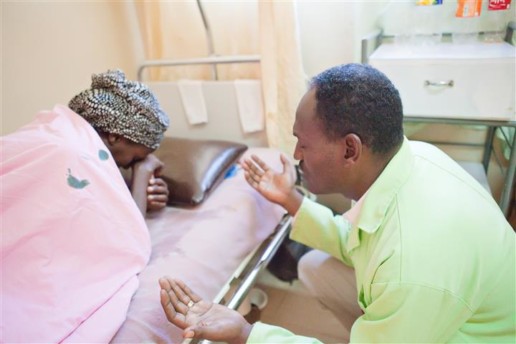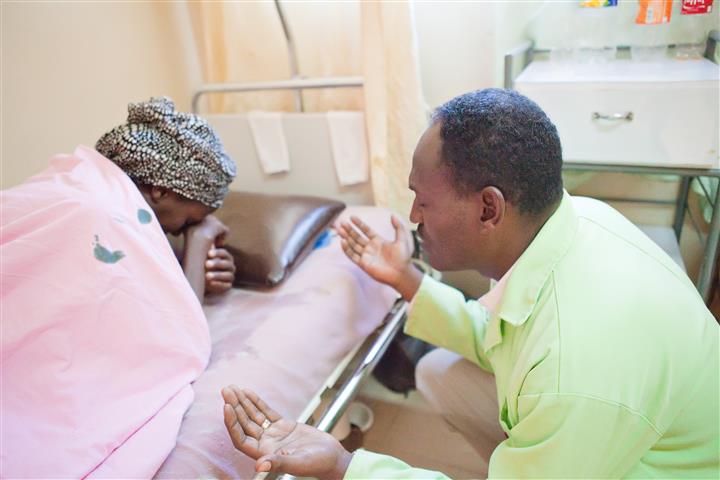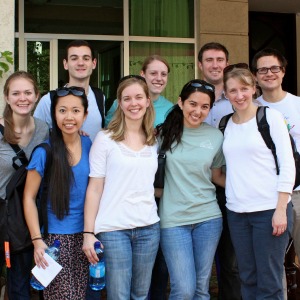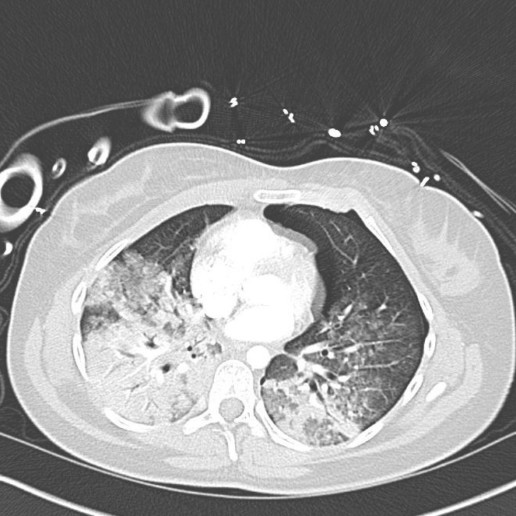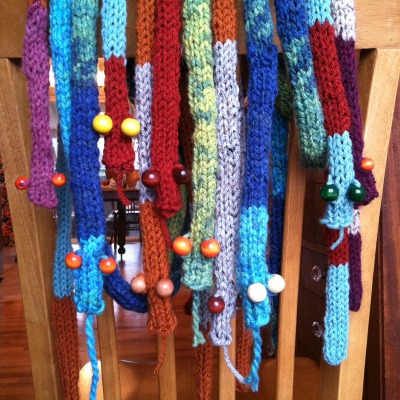One Day Too Late
April 9, 2014Medical Care,Patient Stories
"If only she had come in one day sooner." I can't tell you how many times I think that here. Elfinesh was a 32 year old woman in the prime of her life, with a loving husband and two small children. She came in to the emergency room with a history of four days of vomiting. The illness, abrupt in onset, had taken a horrific toll on her body in such a short time. It was probably sepsis - when an infection spreads rapidly through the body via the blood.
We worked as hard as we could. Three of our staff doctors and two of our nurses attended to her simultaneously. Placing IV lines, giving fluids, antibiotics, running tests. Elfinesh clung to life, but she was so far gone that she was in a coma and unresponsive to anything. A few hours into her course, she stopped breathing. We tried to support her breathing, and when her heart stopped, we tried CPR. Unfortunately, our attempts came to nothing, and after about four hours, she passed from this life into the next.
I wish I could tell you this was a rare occurrence. But the reality is that in a country where access to medical care is sorely lacking, many patients wait too long. Maybe they live several days' walk from the nearest health center. Maybe they have no money to scrape together even the $2 that it would take to see a doctor. Perhaps they are delayed by traditional and cultural healing practices that actually exacerbate the problem. The barriers to care are numerous, and as a result, many suffer. All of our providers can tell stories of patients who came in just a day too late.
You see, there are no Minute Clinics in Ethiopia. In our region of 3 million people, there are only two hospitals. There are no accredited laboratories. In a country of 90 million people, there are only 18 CT scanners. There are NO cardiac surgeons. Consider even the lack of the most basic of health care needs - trained general practitioners. In Ethiopia, there is only one doctor for every 50,000 population. (In the US, there are 100 times as many providers per capita).
We are working to address these issues. Not only are we providing care, but we are training in order to build capacity. But we need your help! With funding, we can provide more training and more service. We can expand access so that there are fewer stories that end like Elfinesh's. Help us help Ethiopia.
Happy World TB Day 2014!
March 24, 2014Medical Care,Fundraising
You probably haven’t heard much about tuberculosis, or TB. Maybe you remember that Nicole Kidman’s character Satine in Moulin Rouge died from TB. Or you remember Katerina Ivanova in Dostoevsky’s Crime and Punishment. But you probably don’t personally know anyone with the disease.
But the fact is, TB is everywhere. Epidemiologists estimate that 2.3 billion people in the world are infected with TB. Let that sink in for a minute. Two point three billion. Fully one-third of the world’s 7 billion population.
Why have you not heard much about it then? Well, because in the US, less than 1% of the population has been infected with TB.
The thing is, TB is a disease of the developing world. Every year, 9 million new people are diagnosed with TB disease – and 98% of them live in the developing world. Nelson Mandela said, “The world has made defeating AIDS a top priority. This is a blessing. But TB remains ignored. …We can’t fight AIDS unless we do much more to fight TB as well.”
In the emergency room in Ethiopia, I see TB every single day. Literally. Last week, I saw a woman come in with abdominal pain who had lost a fourth of her body weight. She looked like a skeleton. Her abdomen was rigid and tender, and it turned out she had TB infection of the intestines. Another day, I saw an adolescent with back pain because TB had destroyed his spine (we call this Pott’s disease).
This is the kind of stuff that you only read about in textbooks in America. But in Africa, it is deadly real. Ethiopia is one of the “high burden” countries for TB – 22 countries which make up 82% of the entire world’s cases . In Ethiopia, there are 280,000 new cases of TB diagnosed every year. Epidemiologists call this “incidence”. (By contrast, in the US, there are about 10,000 new cases of TB every year). The Millennium Development Goals are seeking to reduce TB in countries like Ethiopia. But the political will is lacking. There are few high profile celebrities with TB. Research dollars that go toward TB are dwarfed by that of HIV. Though we have countless new drugs for HIV, we have NO NEW DRUGS to treat TB.
What can we do to fight TB? For centuries, the only way to diagnose it has been by looking at someone’s sputum under a microscope. And this only catches TB 50% of the time! (In contrast, the test for HIV is in the blood, and is 99% accurate at detecting the disease). Finally, in recent years, a device has been developed that can confirm TB. It is called the GeneXpert, and we hope to get one here at Soddo Christian Hospital.
So today, on World TB Day, perhaps you find yourself asking, “What can I do to help stop TB?” Well, if you’re a friend of Soddo Christian Hospital, the answer is surprisingly simple. We would like to get a GeneXpert. It will make diagnosis of the disease more accurate, and allow us to help many more people. We will detect when patients are suffering from this horrible disease, and can start lifesaving therapies immediately.
Barnabas' St.ory
March 14, 2014Medical Care,Guests
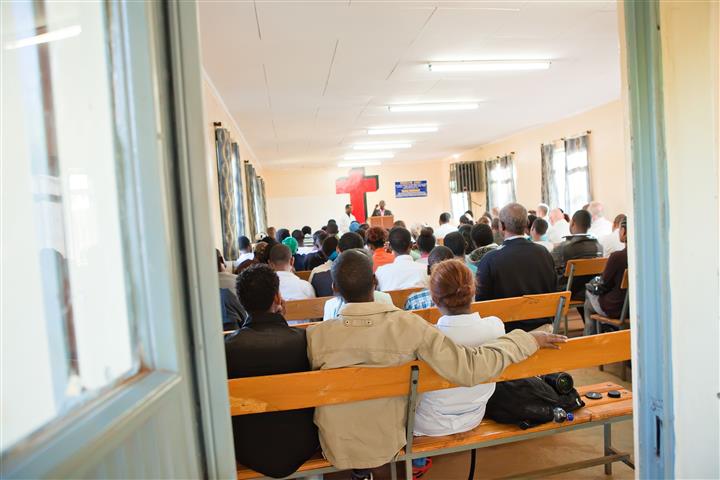 Every Wednesday morning, the hospital staff at Soddo Christian Hospital gathers together before work for a chapel service led by the chaplains. Songs are sung, the Word is opened, and testimonies are shared. For our team, here only a short time, it was a highlight in a week full of highlights, because we heard the joyful testimony of a teenage Ethiopian boy whose mother is receiving care at the hospital.
Every Wednesday morning, the hospital staff at Soddo Christian Hospital gathers together before work for a chapel service led by the chaplains. Songs are sung, the Word is opened, and testimonies are shared. For our team, here only a short time, it was a highlight in a week full of highlights, because we heard the joyful testimony of a teenage Ethiopian boy whose mother is receiving care at the hospital.
This young boy, whom I’ll call Barnabas, is from a rural area of Ethiopia that lacks infrastructure and educational opportunities for children. In fact, he said, in his home region education is not prized and many are hindered from pursuing one. In his longing to receive an education, he attended a school started by Christian missionaries, where he heard the gospel and became a follower of Jesus.
However, when Barnabas told his family about his decision, they forced him to choose between his family and his faith. He chose faith in Christ, experienced persecution and isolation, and was forced to leave his home. Barnabas moved around, staying with people he hardly knew, all the while growing in his knowledge and love of Jesus.
Barnabas soon received the news that his mother was sick. He returned home and tried to find her health care locally and then at a referred hospital in Addis, but no one could help his mother. Finally a doctor referred him to Soddo Christian Hospital, saying simply, “They can help your mother.”
Barnabas spent the last of his money getting his mother to Soddo. He handed his mother’s care to the doctors and nurses at Soddo Christian Hospital, so grateful that she could be served with the love of Jesus Christ. While his mother is treated, Barnabas has spent his time at the hospital sharing the gospel with patients and their family members, believing strongly, as he says, that “Jesus is the only way. He is the Way, the Truth, and the Life. He has given me life.”
Through the love shown to her at the hospital, Barnabas’ mother, who once forced her son to leave because of his faith, has decided to become a follower of Christ. In Barnabas’ words, he “once was just one” in his town and family, but “now we are two.”
With that, the listening chapel congregation burst into applause, rejoicing that God sees and saves all that desire Him, but also knowing that Barnabas and his mother are not just two but join the multitude of brothers and sisters all across the world who call Jesus their Lord.
St.rategic Gospel Work
March 12, 2014Guests,National St.aff
Our team has been at Soddo Christian Hospital for just two short days, but already we’ve seen and experienced so much of God at work.
One of our team members has spent her days in the lab, using her skills and experience to answer questions that might help the lab run more efficiently. Today, she sat with the Ethiopian techs and mapped out a simple plan that may have profound logistical effects on the hospital. One of the techs said with gratitude, “God sent you. We’ve never had anyone care about the lab before. Could you move here?”
Others of our team have spent hours working one-on-one with Ethiopian staff, teaching them computer skills that will benefit the accounting department, the pharmacy, and other departments.
I spent the morning walking through the wards with Eyasu, one of the chaplains, hearing the stories of the patients, praying for them and their family members, and sharing the gospel. I met people that had traveled hundreds of miles to receive care in Soddo, family members of patients who have slept outside each night so they can care for their loved ones, people who have become Christians at the hospital and planned to testify to God’s healing when they return home, and those who have not yet believed. I loved every minute of shaking hands, saying hello in their language, and sharing and praying as the translator followed behind in the native tongue.
The highlight, however, was watching Eyasu move from room to room, greeting and praying for patients that have been under the chaplains’ spiritual care as long as they’ve been in the hospital. He knew each name, each story, even the names and stories of family members in the room. He also introduced me to the nurses and the cleaners, emphasizing that each one is important to the mission of the hospital and each labors together to share the love of Christ.
In one ward, the chaplain introduced me to a nurse who speaks a certain dialect of a region around Soddo. She joined in with the chaplain and me going room-to-room. But this time, the rooms were filled with many patients and each bed had a family member sitting at watch. I listened as she spoke, not understanding her words, but knowing immediately that she was sharing the gospel and praying silently for the Lord to touch hearts as they listened in in rapt attention. Then she turned to me and all eyes turned with her.
I felt inadequate and unsure, but knew I could simply share how God had rescued me from my sin and hopelessness. And as I spoke, I realized with clarity the truth of what I was saying to a room full of people unlike me in language and culture: it is true that God loves all people the same and desires all to submit to Him. We’re different in our externals, but we’re all the same in our need.
When I walked out with the nurse, I hugged her and told her how encouraged I am by her work. God is using her at Soddo Christian Hospital. But it’s not just her; she’s but one example. He’s using everyone—the cleaners, the nurses, the doctors, the Ethiopian staff, the international staff, the chaplains, the cashiers, and the lab techs—to work in tandem to speak the gospel and authenticate it through loving care.
There is such strategy and purposefulness to their work. And God is blessing it. He’s meeting the external and internal needs of His beloved children in Ethiopia through the people at Soddo Christian Hospital.
Caring for the Caretakers: A Visitor's Perspective
In 2013, my husband Kyle and I had a conversation about both his passion and his discouragement about the missions partnerships we were trying to develop through our church. As the lead pastor who had planted the church a few years back, he'd long held a desire to plant missions in the DNA of our people. But things were moving slowly, some partnerships hadn't gotten off the ground, and he wasn't sure what to do.
A few days prior to that conversation, I had interviewed my college roommate, Christina Gabrysch, for my blog about her experience of raising children overseas. "Perhaps", I said to Kyle, " you could contact them and just find out more about what they're doing?"
And so he did. Kyle talked with Jeremy, Christina's husband, and told him about our church--how we have an inordinate amount of medical people because of the University of Virginia's elite medical school and hospital, how we have college students eager and willing to give their time to go overseas, and how we were seeking partnerships that we could invest in for the long haul. Jeremy simply said, "Why don't you come and see what we're doing?"
And so he did. Kyle and our worship pastor, Joseph, set out to see. They visited Soddo Christian Hospital, went bed-to-bed with the chaplains as they prayed for patients, saw people who might have died if not from the care of the medical staff, heard about the hospital's focus of discipleship, and met the international doctors who have committed to training Ethiopian doctors. He came home with a new, tentative partnership between Charlottesville Community Church and Soddo Christian Hospital.
This week, I am here in Soddo because of that partnership. Our first team is on the ground, helping teach computer classes to the Ethiopian staff, working and training workers in the lab, taking on tasks around the hospital, and even enjoying a game of kickball with the national staff.
In just a few days, we've discovered a few things. God is working, that's for sure. And His people are working in His name, that's also for sure. But one thing stands out to me: the international workers have a visible joy in what they're doing among the people of Soddo, and they are doing excellent work, but they cannot do their work alone. Some of it they must do alone; none of our team members can go in and help with a brain surgery or deliver a baby. But some of it they can't do alone. They need encouragement. They need to remember and celebrate what God has done and is doing. They need the time and space to remember and celebrate what God has done and is doing. The caretakers at some point need to be cared for.
As I prepared for this trip, I got the requisite vaccinations and made arrangements for my children and made plans for our team. In my mind, it's always been a nine-day trip, and then I'll return home and go about my regularly scheduled life. But being here, I'm reminded that this isn't a trip where we do a few helpful things and go home. This is a partnership, a relationship, and we will state our intentions with our consistent presence, encouragement, and prayers. We've essentially said that these doctors and their families will not go at this alone.
So really the preparation begins as we leave, as we ask ourselves: How can we continue to serve? How can we continue to help? How can we remember our co-laborers in prayer and verbal words of encouragement?
If you have ever contributed to Soddo Christian Hospital in some way, you have essentially joined in partnership with God and with those He has led to this place. Remember these doctors today. Offer what encouragement you can. Remind them that God sustains them and that Christ is sufficient. Tell them in whatever way you can that they aren't going at it alone.
Our Remote Team Member
Did you know that you can serve on an African mission team without even leaving your home state? Well, you can!
A few years ago, we met Scott Putnam. Scott and his wife Natalie had felt called to adopt, and were in Ethiopia as part of that process. Scott's background is in IT. But not just any kind of IT. Specifically, health care IT. He is the CEO of Apex Technology Management - a company that among other things, does IT for rural hospitals in California. So, while he was here, he was praying for a way to use his skills to advance the Gospel in Ethiopia. And that's when we met.
At the time, the hospital had just gotten a broadband internet connection. We were looking to start building out a hospital network. Something that would allow us to use digital x-ray and CT, perhaps an electronic medical record, and use web-based resources like UpToDate at the bedside. Scott and Natalie came to Soddo, and we walked around the campus all week planning out the network. After he returned home, he arranged for donations of switches, servers, and software. All the stuff we needed to get started.
Most people would have stopped there. But Scott didn't.
See, the thing is, with all this stuff, our hospital has moved into the 21st century. But it takes someone to run it all and troubleshoot it from time to time. We have surgeons, doctors, lab techs, nurses, and all that. But one thing we don't have is a Systems Administrator. You know, the computer geek who fixes your computer or your network when it's not working right!
Well, we have that in Scott. Even though he lives in Redding, California, he has committed himself and his company to providing support to us. And I don't mean that he just tells us to reboot the server once and a while. No, this guy literally spends ten to twenty hours a week working on our network to keep it running smooth so we can take care of patients. He is as much a part of our team as any of the doctors here, and we so appreciate him. (Mind you, he does this on top of being a husband, father to six kids, CEO, and other volunteer work he's involved in!)
The paradigm of global missions is changing in this new, "flat" world. And Scott Putnam is the perfect example of that. A marketplace missionary to Ethiopia from his home in California. Using his unique skills to advance the kingdom of God and the Gospel in this corner of the world. We thank God for him.
Putting Our New Gifts to Work!
February 13, 2014Patient Stories
Recently, we started running our brand new CT scanner. And it's already making a huge impact in the way we care for patients. We were also able to purchase an ambulance recently, and that too is making a difference. Let us tell you about one such patient whose life was just saved because of these gifts to our hospital.
Yohannes was a victim of a car accident. A terrible car accident that had fractured several of his ribs, and resulted in a punctured lung. Even with supplemental oxygen and a chest tube, we were not able to keep up the oxygen level in his blood. From the x-ray we suspected that he might have lung contusions - a severe bruise to the lung itself - that makes it impossible to breathe. But it wasn't completely clear. Maybe something else was going on? Our surgeons considered taking him to the operating room to open up his chest - a procedure called thoracotomy. But because of our CT, we were able to scan his chest, and the result saved him a brutal surgery. The CT in fact showed severe lung contusions - something that would not be helped with surgery.
So, now what to do with Yohannes? We don't yet have a mechanical ventilator (although we will soon thanks to more donations). So, the only hope for him was to get him to Addis Ababa and a hospital with mechanical ventilation. It was nearing dusk, and the helicopter from nearby Awassa was not able to airlift him there. And so, our brand new ambulance made its maiden voyage to Addis with a patient.
We intubated the young man, and his oxygen levels improved immediately with the bagged air forced into his lungs. One of our anesthetists rode in the back, squeezing the bag for six hours all the way to Addis! He got to the hospital there in the middle of the night, and got placed on a ventilator. I spoke with the ICU doctor at the accepting hospital today, and though he is critical, he has a fighting chance for survival now. If he can be mechanically ventilated while his lungs recover, he just might make it!
This kind of care is only possibly because of our generous donors. Our hearts are filled with gratitude for those of you who made it possible for us to get a CT scanner (which saved this young man a surgery) and an ambulance (which got him to an ICU that could care for him).
Be a part of the team. Join our 100 for 100 campaign today! Pledge $100 monthly gift for the next year, and be a part of the 100 donors who are saving lives in Ethiopia.
Help From Within & Without
We are so energized by our donors and volunteers. We have folks who are giving financially to the hospital. And we have folks who come and serve at the hospital. So naturally, we would be excited about a family who has decided to do BOTH!
Meet Claire Gahm. She's a fourth-year medical student at the Medical School for International Health in Beeraheva, Israel. Her medical school is a partnership with Columbia University. It's actually an American-style medical school that focuses on cross-cultural and global opportunities for the students. Claire came to Soddo for her 2 month international rotation, and is loving it. She's thrown herself in completely - working the ER, assisting in surgeries, and helping out with just about everything.

Now, meet Claire's parents. Her dad is a medical doctor and her mom, a physician's assistant. They've always been supportive of the their daughter's mission efforts, and Soddo Christian Hospital is no different. When Greg and Laurie Gahm began researching where their daughter was working, they wanted to be a part. They instantly joined our "100 for 100" campaign, and became faithful supporters of the hospital!
Raising their kids to be men and women after God's own heart, the Gahms enthusiastically support the places they go to serve and be the hands and feet of Jesus. When we asked Greg about it, he said, "As I speak to Claire about Soddo, I am reminded how our Lord withdrew from the crowds to go to places of refreshment for prayer with His Father. I feel Soddo is such a place. Because of the ' work' that is done there, it is a place of refreshment for all the staff as well as for those in Ethiopia."
We think so too, Greg. God bless your family, and thanks for all you do for Soddo Christian Hospital!
On Her Own Two Feet
January 30, 2014Patient Stories
Imagine being 27 years old and having never walked upright. That was the plight of Mihret. She had been born with a congenital knee dislocation in both legs that made it impossible for her to stand on her own two legs. I saw her in the ER one day recently. She came from Addis Ababa - the capital city five hours away. And she had heard that our hospital was working miracles for people who had never walked. Her entire life, Mihret had crawled on her hands and knees. She wore flip-flops on her hands to protect them from the hot city pavement.

She was poor, and didn't even have enough money to get x-rays taken of both knees. We worked out a deal so she could at least get the x-rays and talk to our orthopedic surgeon about treatment options. Since birth, her dislocated knees had only flexed in the wrong direction, making it impossible to stand. But Dr. Anderson saw her in the clinic and felt like if her knees could be fused, she could stand, and even walk with assistance.
She didn't have a penny to pay for such a surgery, but our Benevolent Fund covered her.
A week after admission, she underwent the first surgery on the left leg. A complex procedure that lasted hours and involved putting a rod through her femur, bridging the distorted knee, and going into the tibia. Mihret lost a lot of blood, an issue complicated by the fact that her blood type was O negative - the most rare type. But she got transfused, and recovered for three weeks before having the right side done. According to Dr. Anderson, "With the experience on the left side, we were able to do the right side without as much bleeding."
Just a few days after that, for the first time in her life, Mihret stood upright on her own two legs.
We have a weekly chapel service at the hospital on Wednesday morning that is attended by most of our hospital staff. We gave Mihret the opportunity to attend chapel, but not just attend. To walk down the center aisle. Never before has our staff reacted to a patient's recovery like they did with her. There was exuberant cheering and applause, and some of our staff cried as Mihret gave thanks to them and to God. A day of rejoicing at Soddo Christian Hospital that will not soon be forgotten.
All of this was possible because of our Benevolent Fund. And you can be a part! We are actively recruiting donors to give on a recurring basis. Right now, we are looking for 100 donors to pledge $100 per month for the next year, so that more like Mihret can get life-transforming treatment. We are giving ourselves 100 days to find these donors. Join the team today!
Soddo Snakes!
We want to introduce you to Jackson. Jackson is nine years old, and lives in Oregon. And he has a heart for Ethiopia.

Jackson heard about our hospital serving the poor in southern Ethiopia, and wanted to contribute to the cause. He knits these adorable multipurpose snakes which he then sells as a fundraiser for US! In the words of Jackson's mom Bethany on her blog, "The smaller snakes are perfect as toys or as special pets. The longer snakes can be wrapped around your neck like a scarf. Soddo Snakes enjoy being draped over your computer screen, placed in your bookshelf, or curled up and displayed in your home."

We asked Jackson why he wanted to do this, and he replied, "I did it because I wanted to help the hospital in Soddo, Ethiopia. I read that they need help with food, and medicine and so I decided to make snakes and sell them for Soddo." Isn't that great? He reports that it takes him about 1-2 hours to make one, and the red yarn snakes are his favorite.
Jackson is giving every penny he earns from selling the snakes to the Benevolent Fund. About this, he said, "I believe I will help at least one person to get what they need for a few days. One person is worth it because everyone should have what they need to live."
Don't you agree? Way to go, Jackson!

